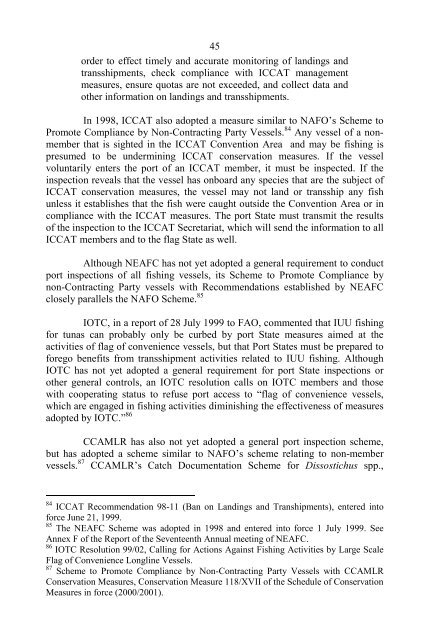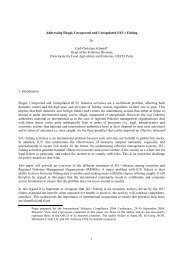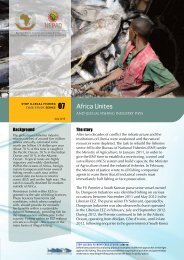Implementation of IPOA/IUU - International MCS Network
Implementation of IPOA/IUU - International MCS Network
Implementation of IPOA/IUU - International MCS Network
You also want an ePaper? Increase the reach of your titles
YUMPU automatically turns print PDFs into web optimized ePapers that Google loves.
45order to effect timely and accurate monitoring <strong>of</strong> landings andtransshipments, check compliance with ICCAT managementmeasures, ensure quotas are not exceeded, and collect data andother information on landings and transshipments.In 1998, ICCAT also adopted a measure similar to NAFO’s Scheme toPromote Compliance by Non-Contracting Party Vessels. 84 Any vessel <strong>of</strong> a nonmemberthat is sighted in the ICCAT Convention Area and may be fishing ispresumed to be undermining ICCAT conservation measures. If the vesselvoluntarily enters the port <strong>of</strong> an ICCAT member, it must be inspected. If theinspection reveals that the vessel has onboard any species that are the subject <strong>of</strong>ICCAT conservation measures, the vessel may not land or transship any fishunless it establishes that the fish were caught outside the Convention Area or incompliance with the ICCAT measures. The port State must transmit the results<strong>of</strong> the inspection to the ICCAT Secretariat, which will send the information to allICCAT members and to the flag State as well.Although NEAFC has not yet adopted a general requirement to conductport inspections <strong>of</strong> all fishing vessels, its Scheme to Promote Compliance bynon-Contracting Party vessels with Recommendations established by NEAFCclosely parallels the NAFO Scheme. 85IOTC, in a report <strong>of</strong> 28 July 1999 to FAO, commented that <strong>IUU</strong> fishingfor tunas can probably only be curbed by port State measures aimed at theactivities <strong>of</strong> flag <strong>of</strong> convenience vessels, but that Port States must be prepared t<strong>of</strong>orego benefits from transshipment activities related to <strong>IUU</strong> fishing. AlthoughIOTC has not yet adopted a general requirement for port State inspections orother general controls, an IOTC resolution calls on IOTC members and thosewith cooperating status to refuse port access to “flag <strong>of</strong> convenience vessels,which are engaged in fishing activities diminishing the effectiveness <strong>of</strong> measuresadopted by IOTC.” 86CCAMLR has also not yet adopted a general port inspection scheme,but has adopted a scheme similar to NAFO’s scheme relating to non-membervessels. 87 CCAMLR’s Catch Documentation Scheme for Dissostichus spp.,84 ICCAT Recommendation 98-11 (Ban on Landings and Transhipments), entered int<strong>of</strong>orce June 21, 1999.85 The NEAFC Scheme was adopted in 1998 and entered into force 1 July 1999. SeeAnnex F <strong>of</strong> the Report <strong>of</strong> the Seventeenth Annual meeting <strong>of</strong> NEAFC.86 IOTC Resolution 99/02, Calling for Actions Against Fishing Activities by Large ScaleFlag <strong>of</strong> Convenience Longline Vessels.87 Scheme to Promote Compliance by Non-Contracting Party Vessels with CCAMLRConservation Measures, Conservation Measure 118/XVII <strong>of</strong> the Schedule <strong>of</strong> ConservationMeasures in force (2000/2001).
















